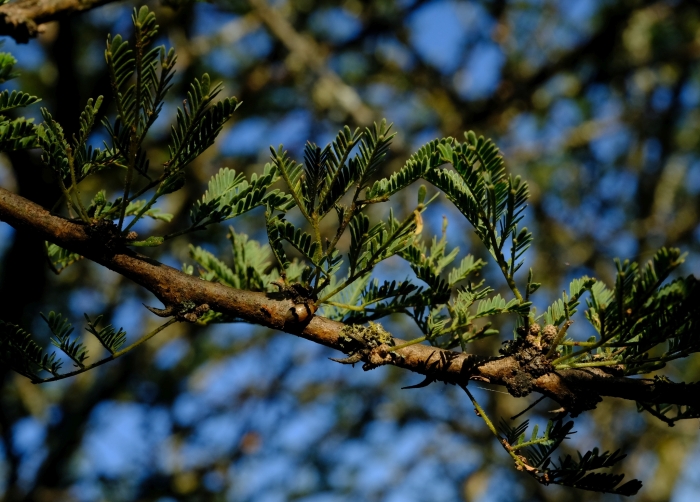Umbrella Thorn Acacia
(Vachellia tortilis)
Umbrella Thorn Acacia (Vachellia tortilis)
/
/

© Nick Helme
CC BY-SA 4.0
Image By:
© Nick Helme
Recorded By:
Copyright:
CC BY-SA 4.0
Copyright Notice:
Photo by: © Nick Helme | License Type: CC BY-SA 4.0 | License URL: http://creativecommons.org/licenses/by-sa/4.0/ | Uploader: botaneek | Publisher: iNaturalist |


















Estimated Native Range
Summary
Vachellia tortilis, commonly known as the umbrella thorn acacia, is a deciduous tree native to arid and semi-arid regions, including savannas, grasslands, and woodlands across most of Africa and parts of the Arabian Peninsula. It is well-adapted to hot climates, withstanding temperatures from 0 to 50°C and annual rainfall ranging from 4 to 40 inches. The tree can grow up to 69 feet tall and is characterized by its distinctive, flat-topped crown, which provides shade and resembles an umbrella. The small, white, aromatic flowers bloom in clusters, typically during the rainy season, and are followed by curled, woody pods that are eaten by a variety of wildlife.
The umbrella thorn acacia is valued for its hardy nature and ability to thrive in challenging environments, making it an excellent choice for reforestation projects and land rehabilitation in arid zones. Its deep root system contributes to soil stabilization, and as a nitrogen-fixing species, it improves soil fertility. The tree’s timber is utilized for furniture and tools, while its pods and foliage serve as fodder for grazing animals. In cultivation, it requires minimal water once established, prefers full sun, and can tolerate a range of soil types, provided they are well-drained. It is also planted for its ornamental value and as a shade tree in hot, dry landscapes. However, gardeners should be aware of its thorny nature and potential to spread if conditions are favorable.CC BY-SA 4.0
The umbrella thorn acacia is valued for its hardy nature and ability to thrive in challenging environments, making it an excellent choice for reforestation projects and land rehabilitation in arid zones. Its deep root system contributes to soil stabilization, and as a nitrogen-fixing species, it improves soil fertility. The tree’s timber is utilized for furniture and tools, while its pods and foliage serve as fodder for grazing animals. In cultivation, it requires minimal water once established, prefers full sun, and can tolerate a range of soil types, provided they are well-drained. It is also planted for its ornamental value and as a shade tree in hot, dry landscapes. However, gardeners should be aware of its thorny nature and potential to spread if conditions are favorable.CC BY-SA 4.0
Plant Description
- Plant Type: Tree, Shrub
- Height: 13-23 feet
- Width: 20-30 feet
- Growth Rate: Moderate
- Flower Color: Cream
- Flowering Season: Summer
- Leaf Retention: Evergreen
Growth Requirements
- Sun: Full Sun
- Water: Low
- Drainage: Fast
Common Uses
Bird Garden, Drought Tolerant, Erosion Control, Low Maintenance, Street Planting
Natural Habitat
Savannas, grasslands, and woodlands across most of Africa and parts of the Arabian Peninsula
Other Names
Common Names: Umbrella Thorn Acacia, African Myrrh, Talha, Umbrella Thorn, Israeli Babool
Scientific Names: , Vachellia tortilis, Acacia gummifera, Acacia spirocarpa var. minor, Acacia tortilis, Acacia tortilis f. tortilis, Acacia tortilis var. tortilis, Mimosa gummifera, Mimosa tortilis, Vachellia tortilis,
GBIF Accepted Name: